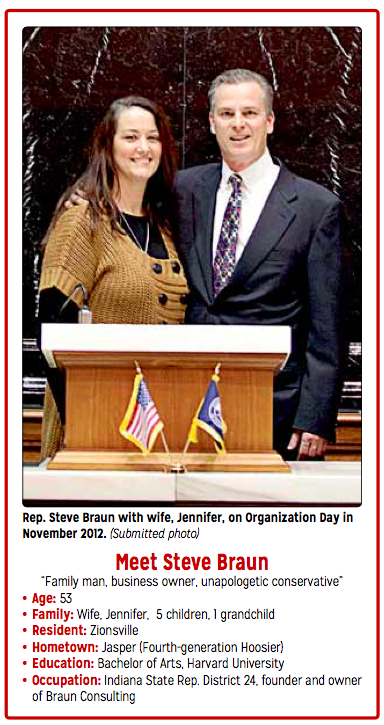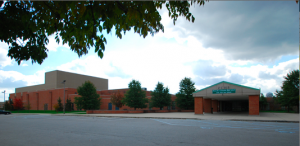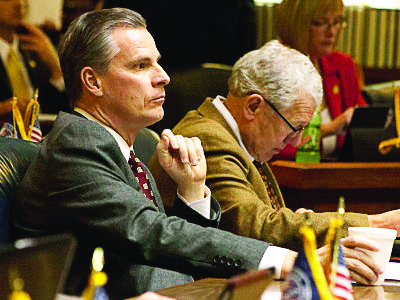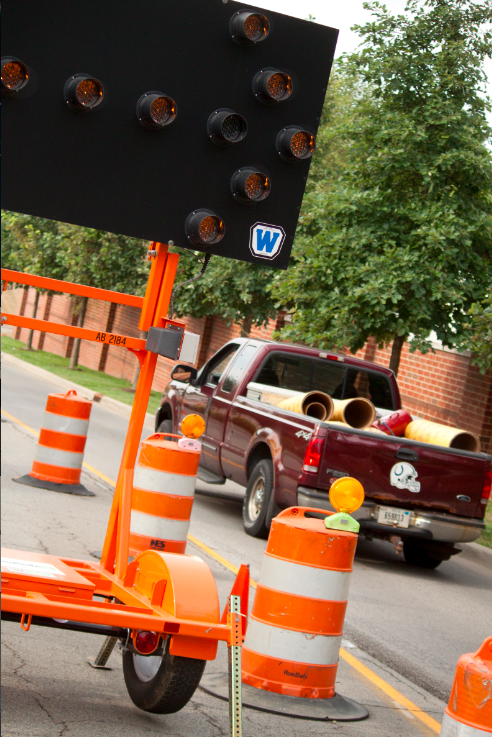Rep. Steve Braun’s first legislative session impacts Zionsville
His first legislative session is finished, but State Rep. Steve Braun’s (R-Zionsville) work will be felt in the months and years to come.
“I don’t think I’ve learned more in a four-month period. It was a challenging and rewarding experience,” said Braun, who represents District 24 which includes portions of Boone and Hamilton Counties.
As a member of the Ways and Means Committee, he had a direct hand in the forming and passing of the new biennial budget which goes into effect July 1 and includes an approximate 5-percent tax cut over four years, putting $1.1 billion back into Hoosier pockets. Local businesses will also benefit from the cuts.
“There are specific tax cuts that would be impactful for all businesses,” Braun said. “Over 90 percent of small business owners file the same as individuals, so they will also benefit from the 5-percent cut.”
Increase in road funding
Another direct impact of this legislative session was an increase in road funding which provides more money to Boone County and also the Town of Zionsville through HB 1001.
“On average, state transportation funding to cities and towns will increase by 34 percent when compared to 2012,” Aaron Smith, founder of Watchdog Indiana, said. “Counties will get 23 percent more transportation dollars from the state with annual funding to the Boone County Highway Dept. increasing approximately $690,000 and to Zionsville approximately $108,000.”
These increases will be effective July 1 but plans for how the $108,000 will be spent are unclear.
“It is a bit premature to speak to exactly how much additional road funding will be available as there are only estimates at this point,” Lance Lantz, director of the Pathways committee, said. However, one project was affirmed.
“Plans are definitely moving forward on the Ford Road roundabout projects,” Town Council President Jeff Papa said.
Direct impact on utilities
Royal Run and some Stonegate residents were directly affected by another piece of legislation, Bill 1307, and were actually the inspiration behind the bill.
“It became apparent to me while campaigning and knocking on doors in Royal Run that there was a problem,” Braun said. “These areas were being serviced by Whitestown so they had no vote (in the rates). It was taxation without representation.”
This issue impacted more than 700 Royal Run homes and residents in portions of Stonegate development. These homes were originally serviced by a private utility company, Boone County Utilities LLC, which went bankrupt. In 2004, Whitestown bought the utility, and this area became serviced by the Whitestown south system, but rates were significantly higher than the north system. 
“The rates we were paying in the south system were a base rate of $42 for 2,000 gallons but it was $24 for that same amount of water in the north system,” Royal Run HOA President Brett Emsley said. “It was almost double what they were paying.”
With Braun’s bill, residents who live in extraterritorial areas like Royal Run in Zionsville and the 350 other extraterritorial communities in the state can petition the Indiana Utility Regulatory Commission to review and negotiate rates.
With Royal Run, changes are already happening as Whitestown recently completed a rate study with a new proposed rate.
“The new rate does exactly what Rep. Braun’s bill was intended to do. It is a proposal where the north and south are now equal,” Emsley said. “During the election, he learned of our situation and after he was elected, he called me right away in December with this idea of the bill. He was ready to go when the session started. He acted quickly to help us and worked through the challenges to get it done.”
Schools – less money, performance grants, more flexibility
School funding was another hot topic in this legislative session. The new budget included an increase in education funding, specifically with the per-pupil funding formula. However, Zionsville schools will actually receive less state money in the coming years as a result of the complexity index, a key component of the funding formula based on the number of students qualifying for free or reduced lunch programs. Despite the work of local superintendents, including Supt. Dr. Scott Robison, the fight for more funding did not result in change, and the funding formula will not be reexamined again until the next biennial budget year in 2015.
“We lost more ground (with the funding formula) and will receive a performance grant that cannot lower class sizes or hire new teachers because of the law’s restrictions. We told our story a great deal,” Robison said. “Intractable political forces and even past practice that makes no sense cannot be overcome in just one session. We will keep at it.”
The performance grant, mentioned by Robison, for high achieving schools could result in approximately $440,000, however, it is restricted to cash performance awards to teachers and cannot be used for teachers’ salaries or General Fund expenses.
 High performing schools including Zionsville received additional relief through Senate Bill 189 which was co-sponsored by Braun. This bill gives more flexibility to high performing schools to allow for innovation in use of technology, curriculum, etc.
High performing schools including Zionsville received additional relief through Senate Bill 189 which was co-sponsored by Braun. This bill gives more flexibility to high performing schools to allow for innovation in use of technology, curriculum, etc.
Despite the disappointment in school funding, ZCS officials were pleased by the strong advocacy provided by the local senators and house members.
“A particular bright spot for us was freshman Rep. Steve Braun, who worked very hard in his first term representing the Zionsville area,” Robison said. “Rep. Braun made a strong effort to educate his colleagues about our situation and the realities of the complexity index, and we certainly appreciate his efforts on our behalf.”




